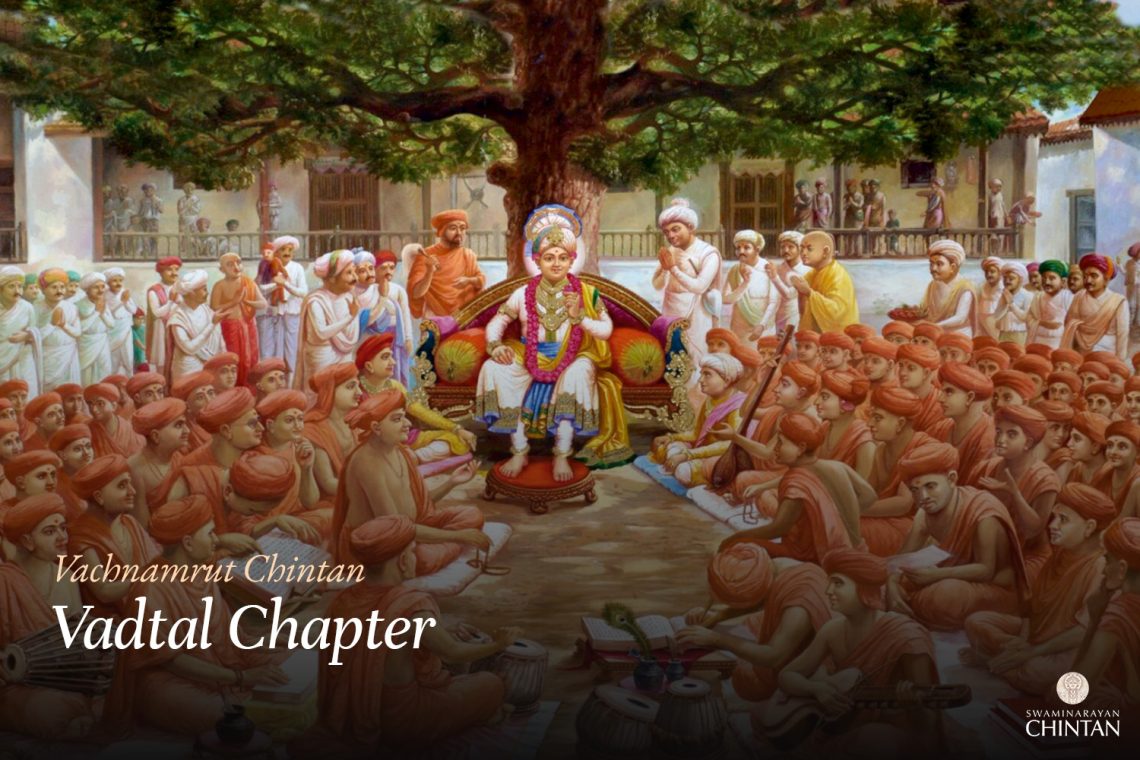Central Insights:
- Divine and Demonical Souls
- The Anvay–Vyatirek (Pervasiveness–Distinctness) of Bhagwan
Key Points:
- A demonic soul never becomes divine.
- Bhagwan is always Vyatirek even when pervading (Anvay) within creation.
Explanation:
The devotees were engaged in discussions about Bhagwan, and the topic of divine and demonical souls arose. They discussed how divine souls naturally become devotees of Bhagwan, while demonical souls inevitably turn away from Bhagwan. At that point, Chimanravji asked Maharaj, “Maharaj, is there any way for a demonical soul to become divine?”
Maharaj responded, “A demonical soul cannot become divine. If, by some means, a demonical soul happens to come into the satsang fellowship, and if no harm or distraction befalls him, he may pass away within the fellowship. Upon rebirth, he may once again enter satsang and, through repeated cycles of merging into Brahm (the ultimate reality) and returning, his demonical nature may gradually diminish. This process, however, is arduous and requires countless cycles of such rebirths before the demonical tendencies are eradicated. Nevertheless, if he manages to please a great Sant within this fellowship, he may instantly transform into a divine soul. However, should any disruption occur, such as criticism or obstacles, his demonical traits may resurface, rendering his progress futile. It is only through uninterrupted reincarnations within satsang that a demonical soul eventually becomes divine.”
Then, Shobharam Shastri asked Maharaj, “Maharaj, how is Bhagwan pervasive (Anvay), and in what way is He distinct (Vyatirek) from creation?”
Maharaj replied, “It is not that Bhagwan is :येन केनापि संबंधन विशेषेण वा अतिशयतया रिच्यते इति व्यतिरेकी – yena kenāpi saṁ bandhena viśeṣeṇa vā atiśayatayā ṛcyate iti vyatirekī, partially present in Maya and partially distinct, residing in His own dham (divine abode). Rather, it is Bhagwan’s intrinsic nature to remain Vyatirek even while pervading within Maya. Vyatirek means to remain completely separate in essence, even in relation to any association. According to the definition, Vyatirek refers to being entirely distinct in essence or by supreme differentiation. Bhagwan’s primary nature is that of Vyatirek. Various schools of thought interpret this differently. For instance, Ramanujacharya emphasizes Bhagwan’s pervasive (Anvay) nature, considering His pervasive and distinct forms as purposeful for bestowing bliss upon liberated souls. He believes Bhagwan’s pervasive form is the essential, intrinsic form, while the distinct form is supplementary. In contrast, Maharaj views the distinct (Vyatirek) form as the fundamental essence, with the pervasive (Anvay) form existing solely for karmic purposes and other functions. Ramanujacharya perceives Bhagwan as initially omnipresent, with His distinct form as an associated state in Akshardham, while Maharaj maintains that Bhagwan’s primary form is localized within Akshardham, with omnipresence as a secondary characteristic. This perspective aligns more consistently with the notion of ‘attaining Bhagwan’s abode upon death.’ If Bhagwan’s pervasive form were primary, there would be no need to journey to His dham. Hence, even from the scriptural standpoint, this view remains coherent.
Now, the inquiry naturally arises: Bhagwan possesses both Anvay and Vyatirek forms. This may seem contradictory, as Anvay suggests complete pervasiveness, while Vyatirek implies complete distinction. How does Bhagwan embody both qualities simultaneously?
Maharaj explains that Bhagwan’s fundamental nature is Vyatirek, though He can pervade everywhere in a manifest form. Maharaj says, “Bhagwan has no fear of being defiled by entering Maya. In fact, when Bhagwan unites with Maya, Maya itself transforms into Akshardham. Consider the example of space and a tree. Just as space resides within a seed and pervades the entire tree, encompassing branches, leaves, and fruits, so does space remain intact even when the tree is cut down. If space were not Vyatirek— distinct from the tree—space too would be severed or consumed by fire along with the tree. However, space remains unaffected, as it is ever distinct. Likewise, as Bhagwan pervades within Maya and its creations, He remains eternally Vyatirek, untouched by Maya’s attributes. He remains forever pure and unaffected. Thus, Bhagwan embodies both pervasiveness and distinction simultaneously, being both Anvay and Vyatirek.”
Glossary
| Daivi Jeev – A divine soul |
| Asuri Jeev – A demonic soul |
| Satsang – Holy fellowship |
| Brahm – Supreme Reality, God The ultimate truth in Vedant, often misinterpreted by dry Vedantists. |
| Anvay – Pervasiveness The quality of Bhagwan being omnipresent and pervading all of creation, existing in everything but remaining distinct and unaffected by it. |
| Vyatirek – Distinction The quality of Bhagwan being entirely distinct and separate from creation, even while pervading it. Bhagwan’s fundamental nature is Vyatirek, meaning He is always independent and beyond the influence of Maya. |
| Akshardham – The eternal supreme abode of Bhagwan Swaminarayan The divine realm where Bhagwan Swaminarayan resides along with Akshar Muktas (Divine Liberated Souls) |
| Maya – Illusion The material energy that entangles the Jeev in worldly existence and distracts from Bhagwan. |
| Ramanujacharya – A Vedantic Philosopher & Sage A proponent of Vishishtadvaita Vedant, emphasizing the servant- master relationship with Bhagwan. |
| Anvay-Vyatirek – Pervasiveness and Distinctness (simultaneously) |

